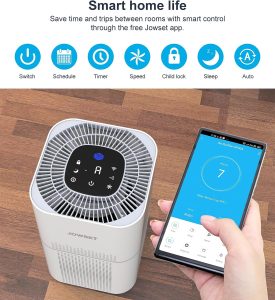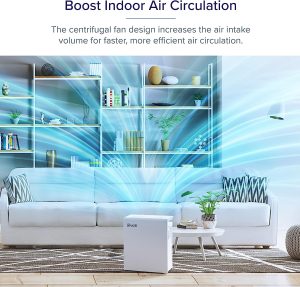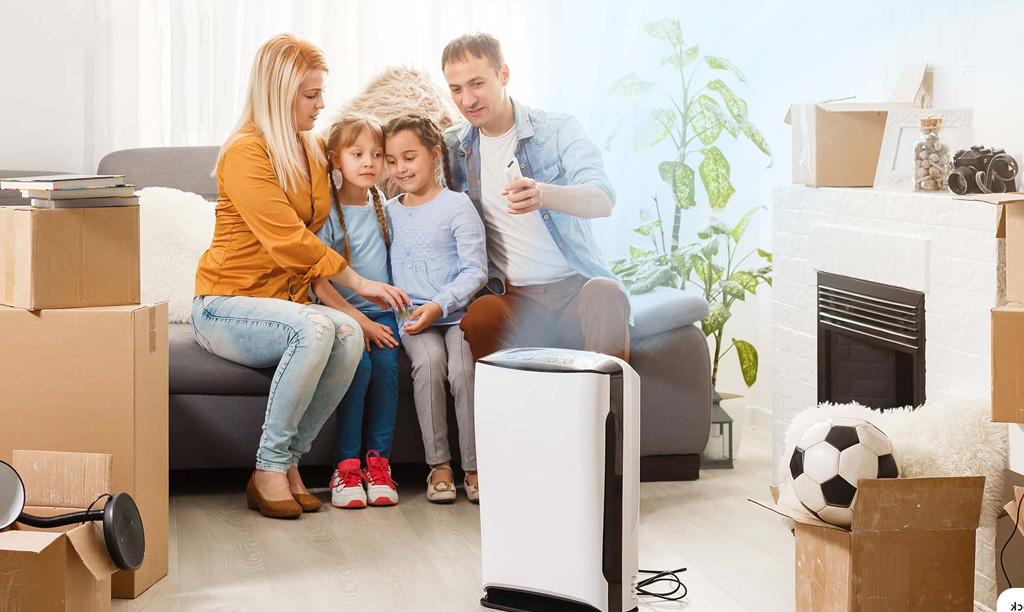We will talk about the potential health advantages of utilizing a home air purifier in this article. We’ll look at how these gadgets operate and how they can specifically enhance the air quality in your house. You will discover how a home air purifier may be able to improve your overall health, from lowering allergens and pollutants to alleviating respiratory problems. So let’s explore the subject and determine whether purchasing a home air purifier is worthwhile for you.
Introduction
What is a home air purifier?
A gadget that assists in cleaning and purifying the air in your home is an air purifier. In order to provide a better and cleaner indoor environment, it works by removing numerous pollutants from the air, including dust, allergies, pollen, pet dander, and odors.
Why are people interested in using home air purifiers?
People are drawn to utilizing home air purifiers for a variety of reasons. Improving indoor air quality is one of the main causes. Due to a number of variables, including inadequate ventilation, chemicals from household items, and the presence of allergens, indoor air can be more contaminated than outdoor air. In order to better your health and wellbeing, using an air purifier can help you tackle these allergens and pollutants.
People with allergies or asthma are also big fans of air purifiers. Dust mites, pollen, and pet dander are a few examples of airborne allergens that can cause these problems or make them worse. Air purifiers can lessen allergy symptoms and enhance lung health by eliminating these allergens from the air.
How do home air purifiers work?
Mechanism of action of home air purifiers
The way that home air purifiers function is by taking air from the surroundings and filtering it. To keep contaminants and airborne particles from recirculating into the space, these filters collect and trap them.
Other purifying techniques used by some air purifiers include electrostatic precipitation, ultraviolet (UV) light, and activated carbon filters. These innovations aid in the neutralization or eradication of pathogens, bacteria, and viruses.
Types of home air purifiers
Home air purifiers come in a variety of designs, each with particular characteristics and advantages.
- High-Efficiency Particulate Air (HEPA) Purifiers: HEPA filters are very good at capturing tiny particles including dust, pollen, pet dander, and mold spores. They can get rid of 0.3 micron-sized particles in up to 99.97% of cases.
- Volatile organic compounds (VOCs), smells, and smoke are all effectively eliminated by activated carbon filters. They function by binding these toxins to the carbon surface.
- UV-C purifiers: By damaging their DNA, bacteria and viruses are killed by UV-C light. Other filtering devices are frequently used in conjunction with these purifiers.
- Ionizers: Ionizers emit ions that attach to airborne particles, making them heavy and falling to the earth. These cleaners may create ozone as a byproduct and are less effective at eliminating tiny particles.
- Ozone generators: Ozone generators shouldn’t be used at home since they might produce a lot of ozone, which is potentially dangerous to your health.
- Hybrid Purifiers: Hybrid purifiers integrate various filtering technologies to efficiently eliminate a variety of pollutants, allergies, and odors.
It’s critical to pick an air purifier that meets your individual requirements and targets the specific allergens or pollutants that are present in your house.

Common pollutants removed by home air purifiers
Dust and allergens
A typical household pollutant, dust is made up of dirt, pollen, and skin flakes. Allergies and respiratory problems may be brought on by these particles. The indoor air quality can be improved by using a home air purifier with a HEPA filter to efficiently capture and remove harmful particles.
Pollen and mold spores
Common allergies that can be found both indoors and outside include pollen and mold spores. They can set off respiratory disorders including allergies and asthma attacks. The likelihood of allergic reactions can be decreased by using an air purifier with a HEPA filter to help remove these allergens from the air.
Pet dander and odors
Pet dander, which is made up of minute skin and hair particles, can make sensitive people have allergic reactions. Pets may also emit odors that are unpleasant and challenging to get rid of. Pet dander and odors can be successfully captured and eliminated by a home air purifier equipped with both a HEPA filter and an activated carbon filter, creating a more comfortable atmosphere for you and your dogs.
Volatile organic compounds (VOCs)
Chemicals called volatile organic compounds (VOCs) are released by a variety of products, including paints, furniture, and cleaning supplies. Long-term exposure to high VOC concentrations can cause respiratory problems as well as other health complications. Air purifiers with activated carbon filters may efficiently remove VOCs, enhancing indoor air quality and lowering health hazards.
Health benefits of using a home air purifier
Reduced allergy symptoms
Reduction of allergy symptoms is one of the biggest health advantages of utilizing a home air purifier. Dust mites, pollen, and pet dander are examples of airborne allergens that can cause allergic reactions in susceptible people. Air purifiers work by eliminating these allergens from the air, which helps to reduce symptoms like congestion, itchy eyes, and sneezing.
Improved respiratory health
A person’s respiratory health may be significantly impacted by indoor air pollution, especially if they already have illnesses like asthma or chronic obstructive pulmonary disease (COPD). Air purifiers can aid in lowering the concentrations of airborne irritants, allergens, and pollutants, which will enhance respiratory health and lessen respiratory symptoms.
Minimized risk of respiratory infections
By catching and eliminating viruses and bacteria that are in the air, air purifiers can reduce the risk of respiratory diseases. When there is a communicable sickness outbreak or during flu season, this is very advantageous. Air purifiers can keep you and your family healthier by minimizing the spread of airborne pollutants.
Elimination of unpleasant odors
Unpleasant aromas brought on by cooking, dogs, or smoke can be effectively eliminated by air purifiers using activated carbon filters. A more pleasant and fragrant indoor environment may result from doing this.
Better sleep quality
A better night’s sleep may also be influenced by cleaner air. Inhaling pure, unpolluted air can encourage relaxation and improve the caliber of sleep. Using a home air purifier can help reduce allergy symptoms and respiratory difficulties that might interfere with sleep. This can help you get a decent night’s sleep.
Factors to consider when choosing a home air purifier
There are a number of crucial aspects to take into account when picking an air purifier for your house to make sure you make the best decision possible.
Room size and air purifier capacity
The size of the space or area that needs purification is a crucial factor. Using the wrong size air purifier could result in ineffective air cleansing because air purifiers are made to handle a specified room size. Make sure to review the manufacturer’s guidelines for recommended room sizes and pick a purifier that suits your requirements.
Filtration efficiency and types of filters
An air purifier’s ability to capture and remove contaminants depends critically on how well it filters air. HEPA filters are considered to be quite effective in capturing allergens and particles, so look for these in purifiers.
Take into account the purifier’s filter kinds as well. To achieve thorough air filtration, some purifiers incorporate numerous filters, such as HEPA filters and activated carbon filters.
Noise level and energy consumption
Some air purifiers, especially those with large fans, can be rather loud. When selecting a purifier, take into account the noise level, especially if you intend to use it in a bedroom or a peaceful setting. Find air purifiers with adjustable fan speeds so you can strike a balance between the amount of noise they make and how well they clean the air.
Another crucial aspect to think about is energy usage, particularly if you intend to run the purifier continuously. Look for purifiers that have Energy Star accreditation or energy-saving features.
Additional features and maintenance requirements
Air quality sensors, timers with configurable schedules, and remote controls are some of the extra features that some air purifiers offer. Convenience and user experience may be improved by these improvements. But bear in mind that adding functions could make the purifier more expensive.
Take into account the air purifier’s maintenance requirements as well. Periodically replacing filters may be necessary, thus it’s critical to consider the price and accessibility of replacement filters while selecting your choice.
Potential drawbacks of home air purifiers
Although home air purifiers provide many advantages, it’s vital to be aware of some possible disadvantages.
Ozone emissions and health concerns
Ozone can be created as a byproduct by several air purifiers, including some ionic purifiers and ozone generators. Ozone is a lung irritant that can exacerbate respiratory problems, especially in people who already have asthma or other lung ailments. Particularly for people with respiratory sensitivity, picking an air purifier that doesn’t emit ozone is vital.
Limited effectiveness on certain pollutants
Home air purifiers are efficient at eliminating and absorbing common contaminants, however their efficacy may be limited when it comes to formaldehyde or radon gas. In such situations, it’s crucial to deal with the pollution’s underlying cause and seek professional advice on the best mitigation measures.
Cost of purchasing and maintaining the air purifier
An air purifier’s maintenance costs and cost of purchase should both be considered. Depending on the brand, size, and features of the air purifier, the cost can vary. The cost of ownership over time may also increase due to replacement filters. When choosing an air purifier, it’s crucial to take your budget and future costs into account.
Tips for optimizing the use of a home air purifier
The following advice will help you get the most from your home air purifier:
Proper placement of the air purifier
Put the air purifier in the space, such as the living room or bedroom, where you spend the most time. Make sure there is sufficient room around the purifier for adequate airflow. Place the air purifier far from any walls or pieces of furniture that can block the airflow.
Regularly clean and replace filters
For filter cleaning and replacement, adhere to the manufacturer’s recommendations. The efficiency of the purifier in catching and eliminating pollutants from the air is maintained by routinely cleaning and replacing filters.
Maintain proper humidity levels in the room
Ensure that your home has the right amount of humidity because too much humidity might encourage the growth of mold and other allergens. If necessary, use a dehumidifier to regulate humidity levels and stop the growth of mold.
Expert opinions on home air purifiers
Views of healthcare professionals
Home air purifiers can be helpful, especially for people with allergies or respiratory issues, according to most medical professionals. They advise staying away from ozone-producing purifiers and opting for devices with HEPA filters instead. However, it’s crucial to speak with a medical expert for specialized guidance based on your unique medical requirements.
Research findings and scientific studies
The effectiveness of air purifiers in lowering airborne allergens and enhancing indoor air quality has been demonstrated in several scientific research. For instance, a research in the Journal of Allergy and Clinical Immunology discovered that using HEPA air purifiers considerably reduced the amount of cat allergen in households where cat allergy sufferers resided.
The evidence now available indicates that air purifiers can have a good effect on indoor air quality and respiratory health, even if additional research is necessary to properly understand the long-term health advantages of these devices.
Frequently asked questions about home air purifiers
Are home air purifiers noisy?
Depending on the model and fan speed settings, home air purifiers can produce a range of noise levels. While some purifiers may be reasonably quiet, some could make noise, especially when the fan speed is increased. Look for purifiers with low noise ratings or variable fan speeds if noise is a problem.
Do air purifiers eliminate cooking odors?
Cooking scents can be successfully eliminated with air purifiers with activated carbon filters. Cooking odors are lessened in the air thanks to activated carbon filters, which are made to collect and trap odorous compounds.
Can home air purifiers help with asthma symptoms?
By removing airborne allergens like dust mites, pollen, and pet hair, home air purifiers can help lessen asthma symptoms. It’s crucial to remember, though, that using an air purifier is not the only way to cure asthma. They must be used in conjunction with a thorough asthma management strategy that has been recommended by a medical expert.

Conclusion
In conclusion, home air purifiers enhance indoor air quality and lessen exposure to allergens and pollutants, which has a positive impact on health. They can lessen allergy symptoms, strengthen the immune system, lower the risk of respiratory infections, get rid of bad odors, and improve sleep quality. Consider elements including room size, filtration effectiveness, noise level, energy consumption, and maintenance needs when selecting an air purifier. Air purifiers can be a useful addition to your house, delivering cleaner and healthier air for you and your family, even though there are some possible expenses and cons.

